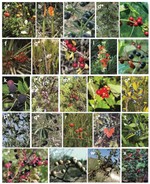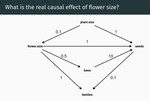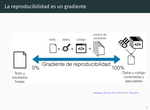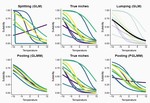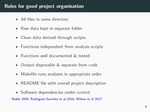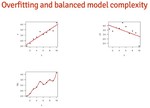Computational Ecology & Data Science
11 September 2018

I am particularly interested in developing new quantitative methods and software tools to improve the value, efficiency, reproducibility and robustness of scientific research. I always try to incorporate state-of-the art data science techniques (literate programming, version control, unit testing, defensive programming, continuous integration) to deliver top-quality reproducible research. I am also quite involved in teaching modern statistics and computing practice to hundreds of students every year.
Related
Posts
Bayesian inference of bipartite networks structure
Inferring the structure of bipartite (e.g. pollination, frugivory, or herbivory) networks from field (observational) data is a challenging task. Interaction data are hard to collect and require typically large sampling efforts, particularly to characterize infrequent interactions.
Last updated on
2 December 2024
5 min read
Mapas de sombra
La sombra es un recurso escaso y muy necesario en la mayoría de ciudades y municipios. Este año -el más calido registrado hasta ahora- se estiman casi 5.000 muertes asociadas al calor en España.
Last updated on
28 October 2022
3 min read
Gracias / Thank you
I have just come back from a wonderful meeting of the Spanish Terrestrial Ecology Association ( AEET) where I received a prize for contributing towards a more open and reproducible science.
Last updated on
22 October 2021
4 min read
New Ecoinformatics working group
Earlier this year a few colleagues (Ignasi Bartomeus, Sara Varela, Antonio J. Pérez-Luque, and myself) created a new working group on Ecoinformatics within the Spanish Terrestrial Ecology Association (AEET). Our main goals are to promote knowledge and training and exchange experiences on all aspects of ecoinformatics, including data management, statistical modelling, programming, etc.
29 August 2016
1 min read
Reproducible workflows
As a side product (or trailer) of our paper on reproducible science, we made a video promoting reproducible workflows. Particularly, showing how using Git and Rmarkdown make your research and scientific collaboration way much easier and better, compared to a typical (non-reproducible) workflow involving Excel, Word, some figure production software, and a lot of manual steps.
29 August 2016
1 min read
Writing papers in Rmarkdown
Rmarkdown is a great tool for reproducible science. You can combine text and code to produce dynamic reports that generate updated results with a single click, as in the example below.
12 May 2016
2 min read
Should supervisors review their students' code?
I have supervised my first master project this year. The project is coming to an end, and I am very happy with the results as well as the fully reproducible workflow we have followed: all developed on GitHub using R package structure and Rmarkdown.
9 September 2015
2 min read
Toward a more reproducible ecology: calculating plant cover in vegetation transects in R
Science has a big reproducibility problem: hardly anyone can reproduce (i.e. re-run, re-obtain) the results of most published papers (including authors themselves!). That is a big problem not only for science as a collective enterprise but also for scientists' everyday life (‘how did I do this?
8 July 2015
2 min read
Spatial data in R: using R as a GIS (new version)
Roughly one year ago, I posted here a tutorial on how to make basic GIS operations in R like importing, analysing, exporting and mapping spatial data, both raster and vectorial (i.
26 February 2013
1 min read
Spatial data in R: using R as a GIS (old version)
NOTE: This is an old version. The tutorial has been updated. You can find the new version HERE.
In a previous post I pointed out several free alternatives for Geographical Information Systems (GIS).
10 December 2011
9 min read
Workshop: an introduction to contemporary statistics using R
Next week I am teaching a course on statistical data analysis using R, here in the Department of Plant Sciences, University of Cambridge. It is aimed at advanced undergraduates, graduate students, and other researchers with no or little experience in statistical analysis and/or R.
7 October 2011
2 min read
Free GIS for ecologists, biogeographers and evolutionary biologists
My colleague Neftalí Sillero and Pedro Tarroso have published recently a nice comparative review of different free and open source Geographic Information Systems (GIS) which can be useful to ecologists and evolutionary biologists willing to start using these tools or trying alternatives to proprietary software (mostly ArcGIS).
18 September 2011
2 min read
Checking and organising your species lists - the easy way
Many of us often need to gather species lists, either from our own field surveys or from bibliographical sources and databases. Many problems may arise during this process. For instance, a species may have been given different names by different authors, and we don’t know which one is currently accepted.
10 March 2011
1 min read
Publications
FRUGIVORY CAMTRAP: A dataset of plant–animal interactions recorded with camera traps
Ecological interactions are a key component of biodiversity, essential for understanding ecosystem services and functioning. Recording …
Villalba P, Arroyo-Correa B, Calvo G, Homet P, Isla J, Mendoza I, Moracho E, Quintero E, Rodriguez-Sanchez F, Jordano P
The easyclimate R package: easy access to high-resolution daily climate data for Europe
In recent decades there has been an increasing demand in environmental sciences for harmonized climatic data at large spatial scales …
Cruz-Alonso V, Pucher P, Ratcliffe S, Ruiz-Benito P, Astigarraga J, Neumann M, Hasenauer H, Rodriguez-Sanchez F
Evaluación del estado de conservación de las Dehesas Extremeñas usando LiDAR del PNOA y el Inventario Forestal Nacional (IFN IV)
Se evaluó el estado de conservación del hábitat de interés comunitario 6310 (Dehesas perennifolias de Quercus spp.) en Extremadura …
Lobo A, Duque-Lazo J, Rodriguez-Sanchez F, Tomé JL, Bernal N
Primary Coenzyme Q deficiencies: A literature review and online platform of clinical features to uncover genotype-phenotype correlations
Primary Coenzyme Q (CoQ) deficiencies are clinically heterogeneous conditions and lack clear genotype-phenotype correlations, …
Alcázar-Fabra M, Rodríguez-Sánchez F, Trevisson E, Brea-Calvo G
Rdataretriever: R Interface to the Data Retriever
The Rdataretriever provides an R interface to the Python-based Data Retriever software. The Data Retriever automates the multiple steps …
Senyondo H, McGlinn DJ, Sharma P, Harris DJ, Ye H, Taylor SD, Ooms J, Rodriguez-Sanchez F, Ram K, Pandey A, Bansal H, Pohlman M, White EP
Quince consejos para mejorar nuestro código y flujo de trabajo con R
La mayoría de los ecólogos que escribimos código informático para desarrollar nuestros análisis somos autodidactas. Nunca hemos …
Rodríguez-Sánchez F
Academia needs Data Science
Academia has proven slow to adapt best practices and retain many brilliant quantitative scientists. This is bad for science, as …
Rodríguez-Sánchez F, Marwick B, Lazowska E, VanderPlas J
Reproducible science: what, why, how
Most scientific papers are not reproducible: it is really hard, if not impossible, to understand how results are derived from data, and …
Rodríguez-Sánchez F, Pérez-Luque AJ, Bartomeus I, Varela S
Talks
Descifrando la Naturaleza: Estadística, Causalidad, Computación y Reproducibilidad en Ecología
23 February 2024
Universidad de Jaén
CityShadeMapper: creando mapas de sombras de alta resolución con datos abiertos de teledetección
Video available on youtube (in Spanish)
20 June 2023
Ciencia reproducible: qué, por qué, cómo
Video of the entire talk available on youtube (in Spanish)
4 June 2021
Cómo escribir manuscritos reproducibles
En esta charla se introducen las ventajas de desarrollar flujos de trabajo reproducibles, y se explica cómo escribir manuscritos, …
8 October 2020
Making interactive leaflet maps with R
14 May 2019
Incorporating evolution in ecological niche modelling
En este seminario se discutirán distintas aproximaciones metodológicas (Smith et al. 2018) para intentar mejorar nuestras estimaciones …
25 February 2019
Structuring data analysis projects as R packages
16 November 2017
Granada, Spain
The natural selection of bad science
2 June 2017
Sevilla, Spain
Model selection in practice (or 'Which variables should I keep in my model?')
Slides discussing variable selection, information criteria (AIC, BIC, DIC), and other statistical modelling issues, with a focus on …
25 March 2014
Model selection and balanced complexity: AIC, BIC, DIC and beyond
Some notes on statistical model selection and comparison, balanced model complexity and predictive accuracy. An overview of different …
5 September 2013
